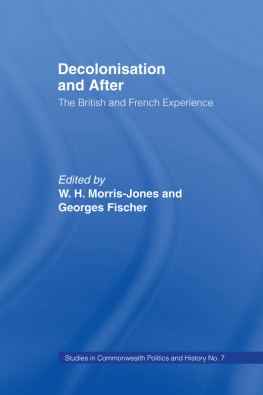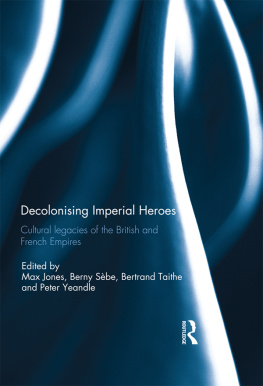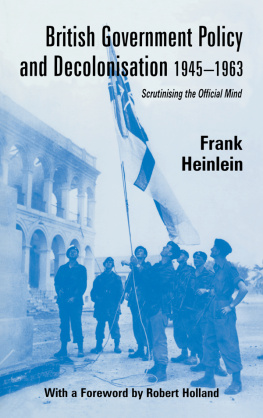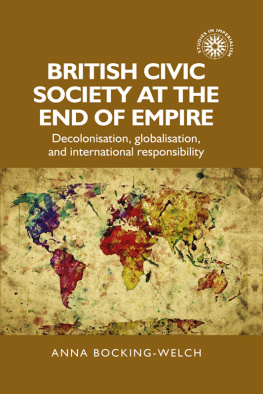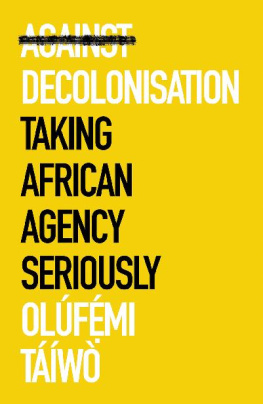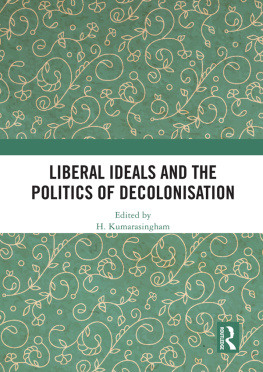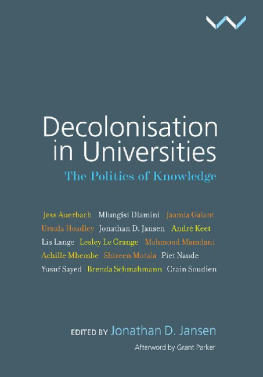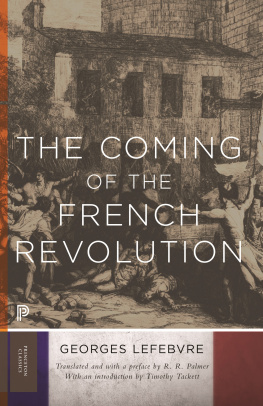Georges Fischer - Decolonisation and After: The British French Experience
Here you can read online Georges Fischer - Decolonisation and After: The British French Experience full text of the book (entire story) in english for free. Download pdf and epub, get meaning, cover and reviews about this ebook. year: 2012, publisher: Routledge, genre: Politics. Description of the work, (preface) as well as reviews are available. Best literature library LitArk.com created for fans of good reading and offers a wide selection of genres:
Romance novel
Science fiction
Adventure
Detective
Science
History
Home and family
Prose
Art
Politics
Computer
Non-fiction
Religion
Business
Children
Humor
Choose a favorite category and find really read worthwhile books. Enjoy immersion in the world of imagination, feel the emotions of the characters or learn something new for yourself, make an fascinating discovery.
- Book:Decolonisation and After: The British French Experience
- Author:
- Publisher:Routledge
- Genre:
- Year:2012
- Rating:3 / 5
- Favourites:Add to favourites
- Your mark:
- 60
- 1
- 2
- 3
- 4
- 5
Decolonisation and After: The British French Experience: summary, description and annotation
We offer to read an annotation, description, summary or preface (depends on what the author of the book "Decolonisation and After: The British French Experience" wrote himself). If you haven't found the necessary information about the book — write in the comments, we will try to find it.
Decolonisation and After: The British French Experience — read online for free the complete book (whole text) full work
Below is the text of the book, divided by pages. System saving the place of the last page read, allows you to conveniently read the book "Decolonisation and After: The British French Experience" online for free, without having to search again every time where you left off. Put a bookmark, and you can go to the page where you finished reading at any time.
Font size:
Interval:
Bookmark:
General Editors: | Professor W. H. MORRIS-JONES |
Institute of Commonwealth Studies | |
University of London | |
Professor DENNIS AUSTIN | |
Department of Government | |
University of Manchester |
No. 1 | D. A. Low Lion Rampant: Essays in the Study of British Imperialism |
No. 2 | R. S. Milne and K. J. Ratnam Malaysia New States in a New Nation |
No. 3 | Dennis Austin and Robin Luckham, eds. Politicians and Soldiers in Ghana: 19661972 |
No. 4 | Peter Lyon, ed. Britain and Canada: Survey of a Changing Relationship |
No. 5 | Keith Panter-Brick, ed. Soldiers and Oil: The Political Transformation of NigeriaTransformation of Nigeria |
No. 6 | James Jupp Sri Lanka : Third World Democracy |
No. 7 | W. H. Morris-Jones and G. Fischer, eds. Decolonisation and After: The British and French Experience |
No. 8 | A. Frederick Madden and W. H. Morris-Jones, eds. Australia and Britain : Studies in a Changing Relationship |

Font size:
Interval:
Bookmark:
Similar books «Decolonisation and After: The British French Experience»
Look at similar books to Decolonisation and After: The British French Experience. We have selected literature similar in name and meaning in the hope of providing readers with more options to find new, interesting, not yet read works.
Discussion, reviews of the book Decolonisation and After: The British French Experience and just readers' own opinions. Leave your comments, write what you think about the work, its meaning or the main characters. Specify what exactly you liked and what you didn't like, and why you think so.

